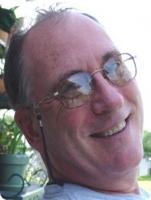
Alan Proctor is a poetry editor for Kansas City Voices and a former humor columnist, tree surgeon, fundraiser, and college administrator. He serves on the board of The Writers Placebased in Kansas City. Proctor will share his work at the September Thomas Zvi Wilson Readings series.
Tuesday, Sept 20
6 p.m.
Central Resource Library
In anticipation of the reading, Proctor shares some thoughts about writing:
Tell us about yourself. How did you get started writing?
I wrote my first poem when I was eight years old. It was a sing-song and plodding piece to convince my mother to stop smoking. Mom loved the poem, but kept puffing away. My mother read aloud to me from an early age, and I suppose those stories peaked my interest in writing. My fifth grade teacher broke her hip and was replaced by a young author who at the end of every school day read to us from a children’s book she had written about two Paleolithic children, Lok and Fa. I still remember their tale set during the ice age thousands of years ago. I knew by the end of fifth grade that I wanted to write, to create my own stories
Why is poetry important?
There are many answers to that question! I think it was Wallace Stevens who wrote, “You can’t get the news from poetry, but people die horribly every day for lack of what is found there.” The editor of New Letters, Bob Stewart, once told me that poetry should “advance the race.” That’s pretty lofty – but it’s also wonderfully noble! For me personally, a poem is often a way to discover something about myself that perhaps I didn’t know. Robert Frost said a poem, “should begin in delight and end in wisdom.” Poetry is important because, when it works, it combines, emotional, intellectual and lyrical cohesion that can stun and surprise.
How does a poem begin for you? Idea? Word? Form? Image?
Yes, yes, yes and yes! A poem could begin with any one of those prompts, although for me, not so much with form. For me a poem often begins with an event – personal or historical. The event itself suggests images, words and sometimes forms. Bear in mind poets rewrite their work over and over (at least I do), so an original idea or image may morph into something quite different – something surprising. I love what Alarie Tennille, a KC poet, recently said at a reading, “Poets want to surprise the reader, and to do that, the poet must surprise herself . . . it’s like sleepwalking on the page.” This is true for fiction as well; sometimes your characters take off on a path you had not originally mapped out.
What is the best writing advice you’ve received?
Two things: first, unless you’re a student just learning the craft, write what you want to write, not what others or the markets say you should write and second, keep going, never lose hope of publishing.
What do you like most about being a writer? Least?
Most – Personally, I love the feeling when, after working hard on a project, all the pieces seem to slip into place and the puzzle is complete. Some say writing is a lonely craft, but I never feel lonely when I write. I feel totally engaged. Tennessee Williams said a good play has the ability to stop time. That’s how I feel when I’m writing – time is suspended.
Least – There’s not a whole lot I don’t like about writing. Well, maybe not finding a publisher for what I consider is my better work. Being told “thank you for your submission, but we feel your work is not a good fit for us.” But really, that usually means you didn’t do your submission research.
Who are your favorite writers?
– if I get through the entire book, it’s often the authors I’m currently reading. Favorite authors include Dave Eggers, Natasha Trethewey, E.L. Doctorow, Robin Robertson, Mark Doty, Richard Russo, Ian McEwan. I could go on and on. I keep a journal of the books I read and critique the ones that move me. Sometimes I make notes about what doesn’t work in a book I’ve read. For me, this is a great learning tool.
Who are you reading right now?
I just finished Thomas Averill’s novel, The Slow Air of Ewan Macpherson, an engaging tale. And I’ve just started a novel I picked up at a recent reading at The Writers Place called, A Plot for Pridemore, by Stephen Roth. I read a lot of poetry, and find that New Letters is among the best sources for a variety of good poets, and I always read the short stories and poetry in The New Yorker. Although I don’t subscribe, Agni and The Missouri Review are good sources. There are a lot good literary journals in English, and I try to read a smattering of many of them. For an indexed list of the most challenging journals in which to publish (and most contain the best writing), Google Duotrope – an excellent, source of information on where to publish your own work.
